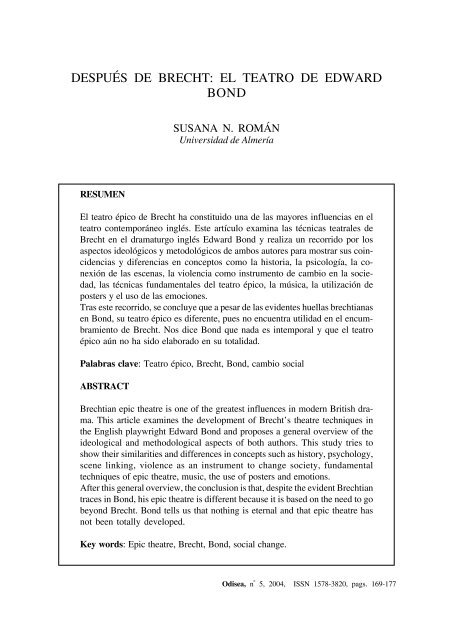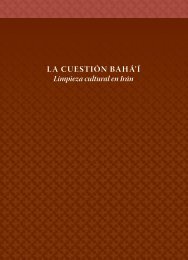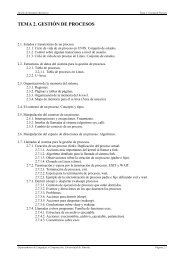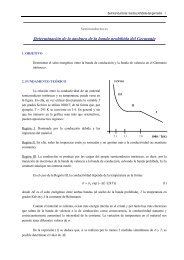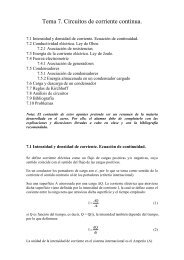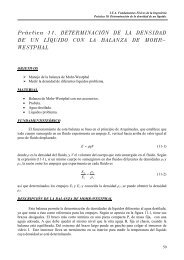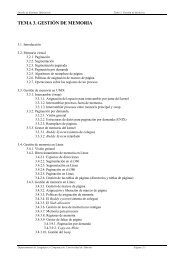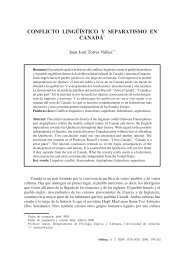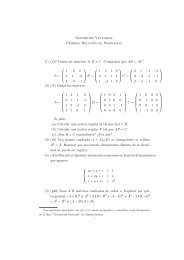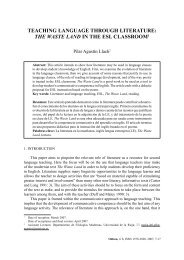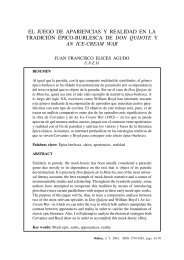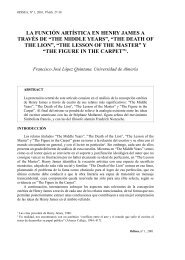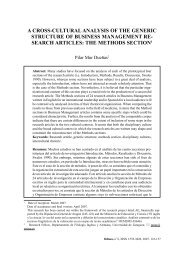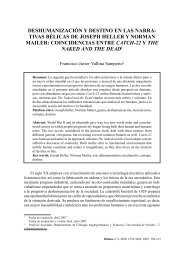el teatro de edward bond - Universidad de AlmerÃa
el teatro de edward bond - Universidad de AlmerÃa
el teatro de edward bond - Universidad de AlmerÃa
You also want an ePaper? Increase the reach of your titles
YUMPU automatically turns print PDFs into web optimized ePapers that Google loves.
DESPUÉS DE BRECHT: EL TEATRO DE EDWARD<br />
BOND<br />
SUSANA N. ROMÁN<br />
<strong>Universidad</strong> <strong>de</strong> Almería<br />
RESUMEN<br />
El <strong>teatro</strong> épico <strong>de</strong> Brecht ha constituido una <strong>de</strong> las mayores influencias en <strong>el</strong><br />
<strong>teatro</strong> contemporáneo inglés. Este artículo examina las técnicas teatrales <strong>de</strong><br />
Brecht en <strong>el</strong> dramaturgo inglés Edward Bond y realiza un recorrido por los<br />
aspectos i<strong>de</strong>ológicos y metodológicos <strong>de</strong> ambos autores para mostrar sus coinci<strong>de</strong>ncias<br />
y diferencias en conceptos como la historia, la psicología, la conexión<br />
<strong>de</strong> las escenas, la violencia como instrumento <strong>de</strong> cambio en la sociedad,<br />
las técnicas fundamentales d<strong>el</strong> <strong>teatro</strong> épico, la música, la utilización <strong>de</strong><br />
posters y <strong>el</strong> uso <strong>de</strong> las emociones.<br />
Tras este recorrido, se concluye que a pesar <strong>de</strong> las evi<strong>de</strong>ntes hu<strong>el</strong>las brechtianas<br />
en Bond, su <strong>teatro</strong> épico es diferente, pues no encuentra utilidad en <strong>el</strong> encumbramiento<br />
<strong>de</strong> Brecht. Nos dice Bond que nada es intemporal y que <strong>el</strong> <strong>teatro</strong><br />
épico aún no ha sido <strong>el</strong>aborado en su totalidad.<br />
Palabras clave: Teatro épico, Brecht, Bond, cambio social<br />
ABSTRACT<br />
Brechtian epic theatre is one of the greatest influences in mo<strong>de</strong>rn British drama.<br />
This article examines the <strong>de</strong>v<strong>el</strong>opment of Brecht’s theatre techniques in<br />
the English playwright Edward Bond and proposes a general overview of the<br />
i<strong>de</strong>ological and methodological aspects of both authors. This study tries to<br />
show their similarities and differences in concepts such as history, psychology,<br />
scene linking, violence as an instrument to change society, fundamental<br />
techniques of epic theatre, music, the use of posters and emotions.<br />
After this general overview, the conclusion is that, <strong>de</strong>spite the evi<strong>de</strong>nt Brechtian<br />
traces in Bond, his epic theatre is different because it is based on the need to go<br />
beyond Brecht. Bond t<strong>el</strong>ls us that nothing is eternal and that epic theatre has<br />
not been totally <strong>de</strong>v<strong>el</strong>oped.<br />
Key words: Epic theatre, Brecht, Bond, social change.<br />
Odisea, n º 5, 2004, ISSN 1578-3820, pags. 169-177
170 SUSANA N. ROMÁN<br />
El uso que <strong>de</strong> la historia hace Edward Bond en sus obras preten<strong>de</strong> una interpretación<br />
d<strong>el</strong> presente y <strong>el</strong> arma <strong>de</strong> cambio para <strong>el</strong> futuro, como señala Klein (1995: 409) en una<br />
entrevista personal con Bond: “The author has always pointed to the need to un<strong>de</strong>rstand<br />
and to interpret rationally our past in or<strong>de</strong>r to use the experiences in our present and not to<br />
repeat the mistakes committed”. Esta utilización d<strong>el</strong> pasado en <strong>el</strong> presente encuentra su<br />
instrumento <strong>de</strong> transmisión en <strong>el</strong> <strong>teatro</strong> épico: “The form of the new drama will be epic”<br />
(Bond, 1992: 108). Como Brecht, Bond <strong>de</strong>fien<strong>de</strong> la necesidad <strong>de</strong> un <strong>teatro</strong> épico, un<br />
análisis <strong>de</strong> la verdad que nos muestre la historia real <strong>de</strong> la humanidad <strong>de</strong>sprovista <strong>de</strong><br />
mitología y manipulación. Este tipo <strong>de</strong> <strong>teatro</strong> es un <strong>teatro</strong> racional que busca <strong>el</strong> análisis <strong>de</strong><br />
las causas, como explica Klein (1989: 91):<br />
Bond’s epic theatre, in its conjunction of poetry and reason, is a rational form of theatre<br />
and has a pragmatic intention. He invites the audience to analyse and to change the <strong>de</strong>humanizing<br />
structures of mo<strong>de</strong>rn society by making them aware of their own oppression and alienation,<br />
and encouraging them to create a new consciousness through a rational un<strong>de</strong>rstanding of the<br />
past.<br />
Este <strong>teatro</strong> encuentra su esencia “in the way it s<strong>el</strong>ects, connects and judges” y, como<br />
señala Roberts (1981: 463), su punto principal resi<strong>de</strong> en “the broad structure of history. It<br />
gives meaning to individual lives by placing those lives clearly in the context of what has<br />
<strong>de</strong>termined the quality of those lives”.<br />
Holland (1978: 27) atribuye la influencia <strong>de</strong> Brecht sobre Bond <strong>de</strong> una manera indirecta<br />
a través <strong>de</strong> William Gaskill 1 y d<strong>el</strong> Royal Court. Sin embargo, <strong>el</strong> propio Bond corrigió<br />
a Holland: “I didn’t get my ‘Brechtianism’ from the Court but from seeing the Berliner<br />
Ensemble in London in the late fifties. They were speaking a foreign language and I had no<br />
theatrical education, but I recognized his importance then as I’d only done with one other<br />
writer, Shakespeare (Bond, 1978: 35).<br />
Al comprobar sus opiniones sobre <strong>el</strong> dramaturgo alemán a lo largo <strong>de</strong> su carrera,<br />
observamos que Bond ha evolucionado <strong>de</strong>s<strong>de</strong> una negación absoluta <strong>de</strong> su influencia<br />
brechtiana hasta su reconocimiento. En 1970 <strong>de</strong>claró en una entrevista: “I don’t think I’m<br />
influenced by Brecht at all” (citado en Holland, 1978: 27), mientras que treinta años<br />
<strong>de</strong>spués reconoce: “You know that I regard Brecht as an influence and of course I shall<br />
continue to be influenced by him” (Bond, 2000: 171). A pesar <strong>de</strong> no reconocer su <strong>de</strong>uda a<br />
Brecht en sus primeras obras, Bond (1972:13) <strong>de</strong>muestra su admiración, aunque consi<strong>de</strong>ra<br />
que sus obras son <strong>de</strong>masiado inocentes: “I rather admire Brecht actually. I think his naivety<br />
covers painful knowledge”.<br />
Innes (1982: 196) argumenta que es precisamente este “painful knowledge” lo que<br />
comparten Bond y Brecht, a<strong>de</strong>más d<strong>el</strong> mismo punto <strong>de</strong> partida filosófico. Ambos <strong>de</strong>fien<strong>de</strong>n<br />
que <strong>el</strong> ser humano está condicionado por la sociedad y que la condición <strong>de</strong> <strong>bond</strong>ad o<br />
maldad viene impuesta por un sistema explotador <strong>de</strong> clases. Las diferencias históricas<br />
entre las clases sociales <strong>de</strong>ben estar reflejadas en la obra teatral para no dar un sentido <strong>de</strong><br />
igualdad contemporánea inexistente: “we must drop our habit of taking the different<br />
1<br />
William Gaskill fue director <strong>de</strong> un grupo <strong>de</strong> creación <strong>de</strong> jóvenes escritores entre los que se encontraba<br />
Bond.<br />
Odisea, n º 5, 2004
DESPUÉS DE BRECHT: EL TEATRO DE EDWARD BOND<br />
171<br />
social structures of past periods […] so that they all look more or less like our own” (Willet,<br />
1964: 190). Este interés por reflejar las diferencias entre las clases sociales persigue <strong>de</strong>mostrar<br />
en escena las contradicciones <strong>de</strong> la realidad social en un sistema capitalista.<br />
Bond <strong>de</strong>fien<strong>de</strong> en “Types of Drama” la necesidad <strong>de</strong> un <strong>teatro</strong> épico que permita un<br />
análisis histórico y sus soluciones: “the play’s figures and inci<strong>de</strong>nts would embody and<br />
<strong>de</strong>monstrate the total historical movement. [...] Inci<strong>de</strong>nts would be chosen to show how<br />
historical problems arise and how they lead to resolutions” (The Activists Papers, 1992:<br />
129). Brecht también concebía <strong>el</strong> <strong>teatro</strong> épico como la única posibilidad <strong>de</strong> presentar la<br />
complejidad humana “in an age in which the life of individuals could no longer be<br />
un<strong>de</strong>rstood in isolation from the powerful trend of social, economical, or historical forces<br />
affecting the lives of millions” (Esslin, 1984: 116).<br />
La historia que se <strong>de</strong>sarrolla en <strong>el</strong> <strong>teatro</strong> épico se convierte en fundamental, <strong>el</strong>iminando<br />
así la supremacía <strong>de</strong> los personajes por la <strong>de</strong> las r<strong>el</strong>aciones humanas en la sociedad. El<br />
análisis psicológico <strong>de</strong> los personajes es irr<strong>el</strong>evante para Bond y para Brecht porque “the<br />
story […] is the sequence of events which constitutes the social experiment of the play; it<br />
provi<strong>de</strong>s the dialectical fi<strong>el</strong>d for the interplay of social forces, from which the lesson of the<br />
play will be seen to emerge” (Esslin, 1984: 123). Siguiendo esta línea, Bond <strong>de</strong>fien<strong>de</strong> en<br />
sus cartas la importancia <strong>de</strong> la historia: “The story is there to show how the characters learn<br />
about thems<strong>el</strong>ves, how they acquire the abilities to un<strong>de</strong>rstand their situation and gain<br />
power over it” (Stuart, 1995: 72), convirtiendo a estas historias comunes en la esencia d<strong>el</strong><br />
drama épico.<br />
Una <strong>de</strong> las principales diferencias entre Bond y Brecht consiste en la conexión <strong>de</strong> las<br />
escenas. Brecht sugiere que cada escena pue<strong>de</strong> ser completa en sí misma y que cada una<br />
pue<strong>de</strong> ser utilizada para representar la realidad, mientras que Bond consi<strong>de</strong>ra esencial la<br />
r<strong>el</strong>ación causa-efecto entre las escenas como parte d<strong>el</strong> análisis. Bond <strong>de</strong>fien<strong>de</strong> así la unidad<br />
en <strong>el</strong> <strong>teatro</strong> épico: “The epic’s structure must have meaning– it is not a collection of<br />
scenes showing that meaning is logically possible. The epic must have a unity based on<br />
practical truth, just as once it was based on mythological coherence. This unity comes<br />
from the analysis, which <strong>de</strong>monstrates, embodies cause and effect in a coherent way.”<br />
(Bond, 1996: 136)<br />
Para Bond (1978: 35), esta r<strong>el</strong>ación causa-efecto es un reflejo <strong>de</strong> la vida y por tanto,<br />
condicionante fundamental en su representación <strong>de</strong> la realidad: “life is or<strong>de</strong>red by cause<br />
and effect, inci<strong>de</strong>nt and choice, problem and <strong>de</strong>cision and this reality must be reflected in<br />
the structure of the play”. Holland (1978: 31) observa que Bond ofrece percepciones<br />
interconectadas d<strong>el</strong> mundo <strong>de</strong>s<strong>de</strong> una perspectiva social y moral, siendo la escena “the<br />
presentation of a moment of society (not of character), and is <strong>de</strong>fined as a segment– not in<br />
the terms of the diachronicity of play-time, but of its synchronic views of real-time”. Bond<br />
<strong>de</strong>forma así la estructura tradicional <strong>de</strong> división temporal, situando en su lugar las divisiones<br />
en <strong>el</strong> argumento <strong>de</strong> acuerdo con la intensidad emocional que pretenda aplicar. Esta<br />
concepción diferente <strong>de</strong> las escenas también se refleja en <strong>el</strong> sentido <strong>de</strong> urgencia que Bond<br />
imprime en sus obras, “the urgency of the time in a world poised to <strong>de</strong>stroy its<strong>el</strong>f” (Roberts,<br />
1981: 459). Esta necesidad hace que Bond utilice al contrario que Brecht “short, even<br />
fragmented scenes to gain intensity, and starkly powerful images for emotional immediacy”<br />
(Innes, 1982: 197).<br />
Odisea, n º 5, 2004
172 SUSANA N. ROMÁN<br />
Para Bond (1996: 136), <strong>el</strong> significado se encuentra en la dramatización d<strong>el</strong> análisis<br />
que se convierte así en <strong>el</strong> cometido principal d<strong>el</strong> público “when the audience are asked to<br />
be not passive victims or witnesses, but interpreters of experience, agents of the future,<br />
restoring meaning to action by recreating s<strong>el</strong>f-consciousness”. Brecht ya había <strong>de</strong>finido al<br />
espectador d<strong>el</strong> <strong>teatro</strong> épico como agente d<strong>el</strong> cambio, oponiéndolo al pasivo espectador<br />
d<strong>el</strong> <strong>teatro</strong> dramático: “The epic’s theatre spectator says: […] That’s not the way […]. It’s<br />
got to stop –the sufferings of this man appal me, because they are unnecessary” (Willett,<br />
1964: 71).<br />
Ambos autores <strong>de</strong>mandan, pues, la necesidad <strong>de</strong> un cambio en la sociedad y hablan <strong>de</strong><br />
la violencia como instrumento <strong>de</strong> cambio. Esslin (1984) habla <strong>de</strong> una postura ambigua <strong>de</strong><br />
Brecht frente a la necesidad <strong>de</strong> la violencia en <strong>el</strong> cambio social ya que por un lado afirma<br />
que es necesaria: “The victory of reason could, for him, only be brought about by violent<br />
means” (228) y por otro, <strong>de</strong>fien<strong>de</strong> la no violencia para una victoria <strong>de</strong> la revolución: “[…]<br />
the movement of the softest water will / Conquer in time the powerful hard stone. / You<br />
un<strong>de</strong>rstand: hard things are overcome…” (243). Bond (1997: 17) tiene claro en On Violence<br />
que la violencia <strong>de</strong> nuestro mundo proce<strong>de</strong> d<strong>el</strong> sistema injusto en <strong>el</strong> que vivimos y que<br />
bajo <strong>el</strong> capitalismo no es posible la paz. Justifica, por tanto, la violencia <strong>de</strong> la izquierda<br />
como único medio <strong>de</strong> lucha en una sociedad irracional en la que la razón ya no es efectiva:<br />
I am not a pacifist, we have to say what things are and not what we would like them to be.<br />
Reason is not yet always effective, and we are still at a stage when to create a rational society<br />
we may sometimes have to use irrational means. Right-wing political violence cannot be<br />
justified because it always serves irrationality; but left-wing political violence is justified<br />
when it h<strong>el</strong>ps to create a more rational society, and when that h<strong>el</strong>p cannot be given in a pacific<br />
form (la cursiva es mía).<br />
Bond ha sido muy criticado por estas opiniones pero es necesario señalar que la mayor<br />
parte <strong>de</strong> sus ensayos critican la violencia y como apunta Klein (1995: 176): “only if no<br />
pacific solution is possible to alleviate the situation of injustice, only then does he propose<br />
to turn to violent action to counteract the organised and controlled violence of the establishment”.<br />
Spencer (1992) explica muchos aspectos en los que Bond y Brecht coinci<strong>de</strong>n, como<br />
su visión <strong>de</strong> la realidad como histórica y sujeta a la intervención humana susceptible <strong>de</strong><br />
cambio, la r<strong>el</strong>ación entre historia e individuo y su rechazo <strong>de</strong> la i<strong>de</strong>ología como mediadora<br />
en la experiencia <strong>de</strong> la realidad. Sin embargo, encuentra una diferencia fundamental entre<br />
ambos autores en los distintos ritmos y referencias, <strong>de</strong>fendiendo la mayor riqueza <strong>de</strong><br />
géneros d<strong>el</strong> dramaturgo inglés. Brecht pensaba que la sociedad irremediablemente se<br />
encaminaba al socialismo, mientras que “Bond shares with most latter-day Marxists the<br />
b<strong>el</strong>ief that history does not move automatically toward socialism or any other pre<strong>de</strong>termined<br />
end” (Spencer, 1992: 7). Po<strong>de</strong>mos <strong>de</strong>cir que ambos buscaban inspirar en su audiencia <strong>el</strong><br />
cambio social, pero Bond va un paso más allá y ya no se pregunta “ ‘how’ change will<br />
occur […], but who will do the changing?” (108).<br />
En cuanto a la utilización <strong>de</strong> Bond <strong>de</strong> técnicas específicamente brechtianas, las parábolas<br />
constituyen un referente fundamental sobre todo en The War Plays. Rein<strong>el</strong>t (1994:<br />
Odisea, n º 5, 2004
DESPUÉS DE BRECHT: EL TEATRO DE EDWARD BOND<br />
173<br />
54) entien<strong>de</strong> que una parábola “sets out a particular mod<strong>el</strong> of the world, usually Utopian or<br />
dystopian, in or<strong>de</strong>r to construct a parall<strong>el</strong> between the posited world and our own”. La<br />
parábola, para Bond y Brecht, no proporciona conocimiento directamente sino que utiliza<br />
la historia como método <strong>de</strong> aprendizaje <strong>de</strong>s<strong>de</strong> un distanciamiento <strong>de</strong> la realidad. Spencer<br />
(1992: 110) explica las ventajas que suponía la técnica <strong>de</strong> la parábola para Bond y Brecht:<br />
“its history of instructional use, its connection with r<strong>el</strong>igious literature, and its ten<strong>de</strong>ncy<br />
toward s<strong>el</strong>f-explication”.<br />
Otro <strong>de</strong> los recursos fundamentales brechtianos en Bond es la utilización d<strong>el</strong> “not…but”<br />
a partir <strong>de</strong> la obra The Bundle (1978). La problemática entre la opción <strong>de</strong> Bien y Mal en<br />
situaciones <strong>de</strong> injusticia presenta su análogo en Brecht, según Spencer (1992: 122), “in<br />
the imposssible or unnatural <strong>de</strong>cision mandated by an inhuman social system”. El <strong>el</strong>emento<br />
brechtiano “Not-But” se encuentra en r<strong>el</strong>ación con esta doble problemática en la que<br />
cada <strong>de</strong>cisión presenta una alternativa y en la que se observa la presión ejercida por la<br />
cultura dominante sobre <strong>el</strong> ser humano:<br />
[…] that is to say he will act in such a way that the alternative emerges as clearly as<br />
possible, that his action allows the other possibilities to be inferred and only represents one<br />
out of the possible variants. […] In this way every sentence and every gesture signifies a<br />
<strong>de</strong>cision; the character remains un<strong>de</strong>r observation and is tested. The technical term for this<br />
procedure is ‘fixing the “not…but”’ (Willet, 1964: 137).<br />
Otra <strong>de</strong> las técnicas fundamentales d<strong>el</strong> <strong>teatro</strong> épico <strong>de</strong> Brecht es <strong>el</strong> establecimiento d<strong>el</strong><br />
“gestus” que permite cambiar <strong>el</strong> énfasis “from the inner life of characters towards the way<br />
in which they behave towards each other” (Esslin, 1984: 124). Spencer (1992) señala<br />
cómo <strong>el</strong> gesto <strong>de</strong> Brecht permanece en la memoria d<strong>el</strong> espectador centrando su atención en<br />
la conexión <strong>de</strong> las r<strong>el</strong>aciones sociales y sus contradicciones, siendo este sentido <strong>de</strong> “iluminación”<br />
<strong>el</strong> que Bond utiliza para sus obras. El contenido d<strong>el</strong> gesto social tiene como<br />
objetivo presentar en escena la r<strong>el</strong>ación social en términos económicos y Bond la reutiliza<br />
en términos políticos: “He always historicizes the inci<strong>de</strong>nts of the narrative, providing a<br />
representation of the social construction of the subject, in scenes with a clear political<br />
gestus” (Rein<strong>el</strong>t, 1994: 51). Holland (1978: 28) <strong>de</strong>muestra que la estructura dramática <strong>de</strong><br />
Bond proce<strong>de</strong> d<strong>el</strong> “gestus” <strong>de</strong> Brecht al utilizar los objetos como la base “for the analysis<br />
of the social existence of the individual”.<br />
La música también es un <strong>el</strong>emento consi<strong>de</strong>rado gestual en <strong>el</strong> sentido brechtiano. Los<br />
números musicales, según Esslin (1984: 118), “are introduced as entir<strong>el</strong>y distinct ingredients<br />
of the play, which interrupt its flow, break the illusion, and thereby ren<strong>de</strong>r the action<br />
‘strange’”. Desuché (1968) entien<strong>de</strong> que la música brechtiana es autónoma en r<strong>el</strong>ación al<br />
texto convirtiéndose a menudo en su negación pero estas contradicciones siempre tendrán<br />
un sentido social y político más que puramente estético. La función <strong>de</strong> la música no es<br />
afectiva “sino que suscita <strong>el</strong> <strong>de</strong>spertar <strong>de</strong> la int<strong>el</strong>igencia, porque fustiga; en un momento<br />
dado, <strong>de</strong>tona y, sin embargo, permanece en secreto acuerdo con aqu<strong>el</strong>lo que los actores<br />
dicen” (Desuché, 1968: 64). Sin embargo, aunque Bond utiliza canciones en muchas <strong>de</strong><br />
sus obras, especialmente Restoration, no está <strong>de</strong> acuerdo con la concepción musical <strong>de</strong><br />
Brecht. Defien<strong>de</strong> que la música no pue<strong>de</strong> ser alienada, no tiene significado, no miente ni<br />
Odisea, n º 5, 2004
174 SUSANA N. ROMÁN<br />
dice la verdad: “Brecht uses music in the way Wagner uses myth. Both are external<br />
authorities” (Bond, 1998: 326). Bond utiliza la música como <strong>el</strong>emento transgresor y no<br />
como mero transmisor <strong>de</strong> lecciones socialistas al modo brechtiano. Worth (1981: 483) ve<br />
en la música utilizada por Bond en Restoration un toque <strong>de</strong> revolución al incluir música<br />
rock en <strong>el</strong> ambiente pastoral d<strong>el</strong> siglo XIX que recrea la obra. Las canciones <strong>de</strong> los criados,<br />
con un sentido agresivo y dinámico, se convierten así en <strong>el</strong> único reducto <strong>de</strong> libertad en <strong>el</strong><br />
que pue<strong>de</strong>n soñar: “They gain the articulacy they lack in that world”.<br />
Bond tampoco coinci<strong>de</strong> con Brecht en <strong>el</strong> uso <strong>de</strong> posters o pancartas sobre la escena. Y<br />
aunque consi<strong>de</strong>ra que ayuda al espectador a enten<strong>de</strong>r lo que se muestra y contemplarlo<br />
<strong>de</strong>s<strong>de</strong> una nueva perspectiva, cree, en su <strong>de</strong>fensa absoluta <strong>de</strong> la racionalidad, que la presentación<br />
física <strong>de</strong> algo no <strong>de</strong>muestra que sea cierto. Sin embargo, la utilización <strong>de</strong> los<br />
coros es fundamental en las obras <strong>de</strong> Bond. Según Desuché (1968: 88), <strong>el</strong> coro es “un canto<br />
que no queda superpuesto en la obra, sino que es como su misma respiración íntima, aérea,<br />
como <strong>el</strong> murmullo <strong>de</strong> los protagonistas”. El coro otorga a obras como The Mother un claro<br />
movimiento hacia d<strong>el</strong>ante, dice lo que piensa la gente, sin comentarios impersonales.<br />
Desuché (1968: 89) <strong>de</strong>fine <strong>el</strong> coro brechtiano, también recogido por Bond, como la forma<br />
<strong>de</strong> liberar “la moral <strong>de</strong> la obra, en este instante, y nos arranca d<strong>el</strong> puro conocimiento<br />
psicológico <strong>de</strong> los personajes con hundimientos <strong>de</strong>ntro <strong>de</strong> la historia: nos llama otra vez al<br />
centro d<strong>el</strong> <strong>teatro</strong>”. Para Bond, <strong>el</strong> coro no pue<strong>de</strong> convertirse en <strong>el</strong> objetivo final sino en <strong>el</strong><br />
medio para transmitir un mensaje. En una <strong>de</strong> sus cartas, se le preguntó a Bond si <strong>el</strong> coro<br />
“My Spain”, <strong>de</strong> Human Cannon, podría ser representado por varias mujeres pero <strong>el</strong> autor<br />
rechazó esta i<strong>de</strong>a por <strong>el</strong> carácter romántico que se le imprimiría: “Otherwise the chorus<br />
becomes a product and not a process” (Stuart, 1995: 74).<br />
Ambos autores difieren inicialmente en uno <strong>de</strong> los <strong>el</strong>ementos clave d<strong>el</strong> <strong>teatro</strong> épico: <strong>el</strong><br />
uso <strong>de</strong> las emociones para implicar a la audiencia. Esslin (1984: 19) encuentra en <strong>el</strong> <strong>teatro</strong><br />
épico <strong>de</strong> Brecht “the rejection of empathy and the emotional involvement of the audience”.<br />
Sin embargo, <strong>el</strong> dramaturgo alemán asegura que su <strong>teatro</strong> ap<strong>el</strong>a más a la razón d<strong>el</strong> espectador<br />
que a sus sentimientos. Al principio, Brecht invitaba a la audiencia a distanciarse <strong>de</strong> la<br />
acción mediante <strong>el</strong> proceso <strong>de</strong> alienación, pero hacia <strong>el</strong> final <strong>de</strong> sus teorías prefirió aunar<br />
emoción y alienación en una propuesta más similar al <strong>teatro</strong> <strong>de</strong> Bond. Las emociones que<br />
preten<strong>de</strong> provocar Brecht van más allá d<strong>el</strong> terror y la piedad como “the love of justice, the<br />
urge to freedom or justified anger”, según observa Esslin (1984: 130), <strong>de</strong>fendiendo una<br />
base clasista que distingue entre ricos y pobres y un carácter temporal en las emociones:<br />
“The emotions are in no sense universally human and tim<strong>el</strong>ess” (Willett, 1964: 145). Bond<br />
habla <strong>de</strong> las emociones en este mismo sentido <strong>de</strong> productividad y no como una cualidad<br />
estática:<br />
I read this morning a remark by a socialist that it was important to emotionally involve<br />
audiences in the play’s action. This seems to be the opposite of Brecht’s alienation. […] We<br />
shouldn’t think of emotions as operating “in a situation” or being nee<strong>de</strong>d to be “controlled” to<br />
achieve socialisation: they are productive of our situation and are produced by them. So<br />
emotions are cultural structures... (Stuart, 1995: 100-101).<br />
Odisea, n º 5, 2004
DESPUÉS DE BRECHT: EL TEATRO DE EDWARD BOND<br />
175<br />
En su intención <strong>de</strong> implicar a la audiencia emocionalmente, Bond crea los “aggroeffects”<br />
que difieren <strong>de</strong> los “alienation effects” <strong>de</strong> Brecht, aunque ambos comparten una<br />
function didáctica: “In contrast to Brecht, I think it’s necessary to disturb an audience<br />
emotionally, to involve them emotionally in my plays, so I’ve had to find ways of making<br />
that “aggro-effect” more complete, which is in a sense to surprise them” (citado en Innes,<br />
1982: 199). Innes <strong>de</strong>fien<strong>de</strong> así la violencia presente en las obras <strong>de</strong> Bond como “a measure<br />
of urgency” y la necesidad <strong>de</strong> presentar la obra teatral no como catarsis aristotélica sino “as<br />
a sort of shock therapy <strong>de</strong>signed to galvanize their consciences into life and provoke them<br />
into viewing society “objectiv<strong>el</strong>y” and “rationally”” (199). Rabey (1986: 114) también<br />
entien<strong>de</strong> que <strong>el</strong> uso <strong>de</strong> las emociones en <strong>el</strong> <strong>teatro</strong> <strong>de</strong> Bond como llamada <strong>de</strong> atención<br />
supone una ruptura fundamental con Brecht. Bond busca una respuesta efectiva en <strong>el</strong><br />
espectador que sólo es posible por medio <strong>de</strong> imágenes duras y sorpren<strong>de</strong>ntes que obligan<br />
a la reflexión y la acción.<br />
Bond (1978: 35) preten<strong>de</strong> <strong>de</strong>sarrollar un “V-effect” 2 menos abstracto que Brecht y más<br />
positivo: “if V-effect becomes mer<strong>el</strong>y the removing of emotional tension so that the object<br />
or situation being inspected just, as it were, floats loose”. En sus últimas obras, Bond ha<br />
continuado <strong>de</strong>sarrollando esta i<strong>de</strong>a en lo que ha <strong>de</strong>nominado Theatre Events (TEs). Spencer<br />
(1992: 227) <strong>de</strong>fien<strong>de</strong> la ampliación d<strong>el</strong> enfoque <strong>de</strong>s<strong>de</strong> los iniciales “aggro-effects” hasta<br />
los TEs sugiriendo un cambio “in the text-actor-audience dynamic” pero aún se observan<br />
claras diferencias con los “A-effect” brechtianos a pesar <strong>de</strong> compartir un similar propósito<br />
político: “TEs explicitly promote audience analysis of a situation that presents its<strong>el</strong>f<br />
onstage as unacceptable (violent), paradoxical (stranged), unb<strong>el</strong>ievable (exaggerated,<br />
un<strong>de</strong>rstated, or absurd), or ironic” (227). El propio Bond (1998: 325) en “Commentary of<br />
the War Plays” encuentra las bases <strong>de</strong> las diferencias entre los efectos brechtianos y los TEs<br />
en las teorías <strong>de</strong> la Ilustración:<br />
TEs are not simple Brechtian alienation effects. […] Yet alienation theory <strong>de</strong>pends on a<br />
philosophy of mind h<strong>el</strong>d by Di<strong>de</strong>rot and other eighteenth-century rationalists. It appeals to<br />
objective judgement but does not secure the means of achieving it. The mind cannot get<br />
outsi<strong>de</strong> its<strong>el</strong>f to be objective. The structure of mind is part of the continuum of society.<br />
A<strong>de</strong>más <strong>de</strong> la base filosófica, los TEs difieren <strong>de</strong> los “A-effects” en cuanto a la autoridad<br />
que confieren al espectador. Rein<strong>el</strong>t (1994: 79) explica que en <strong>el</strong> <strong>teatro</strong> actual la<br />
audiencia se convierte en responsable <strong>de</strong> su propia autoridad: “in TEs the authority resi<strong>de</strong>s<br />
with the producers of that meaning, the triangle of participants and their work on the<br />
text(s)”, mientras que Brecht ap<strong>el</strong>aba a una autoridad externa. Bond también entien<strong>de</strong> que<br />
la alienación <strong>de</strong> Brecht es habitual en <strong>el</strong> <strong>teatro</strong> contemporáneo, por tanto, <strong>el</strong> reto es “to<br />
manipulate the metatext to make the audience the authority– to make them <strong>de</strong>ci<strong>de</strong> what<br />
the alienation is” (citado en Rein<strong>el</strong>t, 1994: 79). Su nueva concepción preten<strong>de</strong> ir más allá<br />
<strong>de</strong> la alienación <strong>de</strong> Brecht y reconoce en una <strong>de</strong> sus cartas que “what has to be alienated is<br />
not the stage but the audience” (Stuart, 1995: 187).<br />
2<br />
Bond se refiere a los “alienation effects” <strong>de</strong> Brecht en algunas ocasiones como “V-effect”, tomado d<strong>el</strong><br />
original alemán Verfremdungseffekt o en otras ocasiones como “A-effect”.<br />
Odisea, n º 5, 2004
176 SUSANA N. ROMÁN<br />
Por otro lado, a<strong>de</strong>más <strong>de</strong> los TEs, Bond ha <strong>de</strong>sarrollado otras técnicas como <strong>el</strong> soliloquio<br />
público proce<strong>de</strong>nte d<strong>el</strong> soliloquio shakesperiano. Klein (1989: 83) señala la importancia<br />
<strong>de</strong> estas nuevas estrategias dramáticas: “The communication tool of ‘direct address’<br />
[...] is an effective <strong>de</strong>vice to arouse the audience’s commitment to the political topics and<br />
social concerns of the play and to engage them more directly and analytically”. Este uso<br />
<strong>de</strong> soliloquios similar a los monólogos y apartes d<strong>el</strong> <strong>teatro</strong> isab<strong>el</strong>ino “accentuates the epic<br />
character of his theatre” (83). Bond <strong>de</strong>fine <strong>el</strong> soliloquio público como un <strong>el</strong>emento esencial<br />
para la transmisión <strong>de</strong> la historia y la conciencia política: “He [the character] then<br />
talks not as he is but as he would be after we have been there. His age stays the same but he<br />
speaks with historical hindsight, with greater political consciousness and stronger political<br />
presence than he yet has. [...] It would be nearer the truth to say that the author becomes the<br />
spokesman of his character...” (Bond, 1992: 139-140)<br />
Tras este recorrido por las coinci<strong>de</strong>ncias y diferencias entre ambos autores, po<strong>de</strong>mos<br />
concluir que a pesar <strong>de</strong> las evi<strong>de</strong>ntes hu<strong>el</strong>las brechtianas en la obra <strong>de</strong> Bond, <strong>el</strong> dramaturgo<br />
inglés <strong>de</strong>sarrolla las nociones d<strong>el</strong> <strong>teatro</strong> épico <strong>de</strong> una manera diferente, dotándolas <strong>de</strong><br />
contemporaneidad. Rein<strong>el</strong>t (1994: 80) concluye que existe una reciprocidad entre ambos<br />
autores: “Edward Bond illuminates Brecht’s work, just as Brecht h<strong>el</strong>ps to interpret Bond’s”,<br />
mientras que Spencer (1992: 4) atribuye a Bond las nuevas creaciones como alumno<br />
aventajado: “Bond’s contribution to mo<strong>de</strong>rn drama will lie in his <strong>de</strong>v<strong>el</strong>opment of a<br />
dialectical theatre along Brechtian lines […] that addresses the most significant political<br />
issues of his time”. Hirst (1985: 127) consi<strong>de</strong>ra importante analizar los dramas épicos <strong>de</strong><br />
Bond <strong>de</strong>s<strong>de</strong> las teorías brechtianas pero reconoce que ambos autores han <strong>de</strong>sarrollado <strong>el</strong><br />
potencial político d<strong>el</strong> <strong>teatro</strong> épico en momentos históricos diferentes. Sin embargo, las<br />
intenciones políticas <strong>de</strong> Bond son más extremas que las <strong>de</strong> Brecht y sus propuestas escénicas<br />
más arriesgadas: “if we observe similarities of method we must also realise that Bond<br />
inevitable goes further than Brecht in disturbing and challenging his audience”.<br />
Bond (1978: 35) ha <strong>de</strong>sarrollado la teoría brechtiana, como él mismo ha reconocido,<br />
pero no todo pue<strong>de</strong> quedar en Brecht: “Brecht is no more a writer for all time than Shakespeare<br />
is”. El dramaturgo alemán perteneció a un momento histórico pasado en <strong>el</strong> que sus obras<br />
<strong>de</strong>pendían <strong>de</strong> hechos muy concretos como <strong>el</strong> surgimiento d<strong>el</strong> fascismo en Alemania pero<br />
Bond, en su generación <strong>de</strong> violencia y sin alternativas políticas, consi<strong>de</strong>ra la aproximación<br />
teatral <strong>de</strong> Brecht pasada <strong>de</strong> moda. Bond no encuentra utilidad al encumbramiento <strong>de</strong><br />
una figura, sea Brecht, Shakespeare o cualquier otro, ya que esto significaría que no hay<br />
nada más por hacer. Nada es intemporal, dice Bond (1978: 35), por tanto, <strong>el</strong> trabajo no ha<br />
concluido ya que <strong>el</strong> <strong>teatro</strong> épico aún no ha sido <strong>el</strong>aborado en su totalidad: “starting with<br />
Brecht but not ending there […] the work is not yet finished”.<br />
REFERENCIAS BIBLIOGRÁFICAS<br />
BOND, E. 1972. “Drama and Dialectics of Violence” Theatre Quarterly, 2, 5: 4-14<br />
—————. 1977. Plays: 1. Saved. Early Morning. The Pope’s Wedding. London:<br />
Methuen.<br />
—————. 1978. “On Brecht: a Letter to Peter Holland”. Theatre Quarterly, 30: 34-35.<br />
Odisea, n º 5, 2004
DESPUÉS DE BRECHT: EL TEATRO DE EDWARD BOND<br />
177<br />
—————. 1992. Plays: 4. The Worlds. The Activists Papers. Restoration. Summer.<br />
London: Methuen.<br />
—————. 1996. Plays: 5. Human Cannon. The Bundle. Jackets. In the Company of<br />
Men. London: Methuen.<br />
—————. 1998. Plays: 6. The War Plays. Choruses from After the Assassinations.<br />
London: Methuen.<br />
—————. 2000. The Hid<strong>de</strong>n Plot. Notes on Theatre and the State. London: Methuen.<br />
DESUCHÉ, J. 1968. La técnica teatral <strong>de</strong> Bertolt Brecht. Barc<strong>el</strong>ona: Tau.<br />
ESSLIN, M. 1984. Brecht. A Choice of Evils. 4 th ed. London: Methuen.<br />
HIRST, D.L. 1985. Edward Bond. Macmillan Mo<strong>de</strong>rn Dramatists. London: Macmillan.<br />
HOLLAND, P. 1978. “Brecht, Bond, Gaskill, and the Practice of Political Theatre”. Theatre<br />
Quarterly, 30: 24-34.<br />
HORMIGÓN, J. A. et al. 1975. Brecht y <strong>el</strong> realismo dialéctico. Comunicación Serie B 41.<br />
Madrid.<br />
INNES, C. 1982. “The Political Spectrum of Edward Bond: From Rationalism to<br />
Rhapsody”. Mo<strong>de</strong>rn Drama, XXV, 2: 189- 206.<br />
KLEIN, H. 1989. “Human Cannon- An Epic History Play by Edward Bond”. Anejos <strong>de</strong><br />
Analecta Malacitana 6. Estudios <strong>de</strong> Filología Inglesa. Málaga: <strong>Universidad</strong> <strong>de</strong><br />
Málaga: 81-91.<br />
—————. 1995. “Edward Bond: An Interview”. Mo<strong>de</strong>rn Drama, 38: 4: 408- 415.<br />
—————. 1995. “Violence in the Theatre of Edward Bond”. In-between Essays &<br />
Studies in Literary Criticism, 4: 2 (September 1995): 163- 179.<br />
RABEY, D. I. 1986. British and Irish Political Drama in the Twentieth Century. London:<br />
Macmillan.<br />
REINELT, J. 1994. After Brecht. British Epic Theater. Ann Arbor: University of Michigan<br />
Press.<br />
ROBERTS, P. 1981. “The search for epic drama: Edward Bond’s recent work”. Mo<strong>de</strong>rn<br />
Drama, 24: 458-478.<br />
SPENCER, J. S. 1992. Dramatic Strategies in the Plays of Edward Bond. Cambridge:<br />
Cambridge University Press.<br />
STUART, I., ed. 1995. Edward Bond. Letters II. Luxembourg: Harwood.<br />
WILLETT, J., ed. 1964. Brecht on Theatre. London: Methuen.<br />
WORTH, K. 1981. “Bond’s Restoration”. Mo<strong>de</strong>rn Drama, 24: 479- 493.<br />
Odisea, n º 5, 2004


